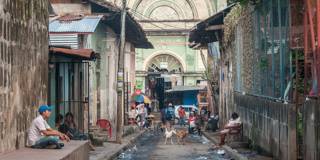Even though it is well known that economic inequality in Latin America and the Caribbean is unacceptably high, efforts to close the gap between rich and poor have fallen short. A new research project aims to provide governments with a more nuanced understanding of this longstanding problem and how to remedy it.
WASHINGTON, DC – Nearly everyone agrees that the unequal distribution of income, wealth, and opportunities in Latin America and the Caribbean (LAC) has hindered efforts to build cohesive societies and robust democracies, as well as frustrating the ambitions of young people. But efforts to close the gap between rich and poor have fallen short, and progress has stalled. Governments urgently need better evidence on how to remedy this longstanding problem.
To this end, the Inter-American Development Bank has teamed up with the London School of Economics, Yale University, the Institute for Fiscal Studies, and academics from more than a dozen leading universities to launch a comprehensive reconsideration of inequality in LAC. The project’s initial research – including critical reviews of the existing literature, fresh data, and new analyses – has already shown that inequality in the region is neither as predictable nor as static as many believe.
For starters, LAC is not uniformly unequal. Some countries, such as Brazil, Colombia, Guatemala, Honduras, and Panama, have extremely high income inequality, whereas others, including Bolivia, the Dominican Republic, El Salvador, and Uruguay, have income disparities similar to that of the United States.

WASHINGTON, DC – Nearly everyone agrees that the unequal distribution of income, wealth, and opportunities in Latin America and the Caribbean (LAC) has hindered efforts to build cohesive societies and robust democracies, as well as frustrating the ambitions of young people. But efforts to close the gap between rich and poor have fallen short, and progress has stalled. Governments urgently need better evidence on how to remedy this longstanding problem.
To this end, the Inter-American Development Bank has teamed up with the London School of Economics, Yale University, the Institute for Fiscal Studies, and academics from more than a dozen leading universities to launch a comprehensive reconsideration of inequality in LAC. The project’s initial research – including critical reviews of the existing literature, fresh data, and new analyses – has already shown that inequality in the region is neither as predictable nor as static as many believe.
For starters, LAC is not uniformly unequal. Some countries, such as Brazil, Colombia, Guatemala, Honduras, and Panama, have extremely high income inequality, whereas others, including Bolivia, the Dominican Republic, El Salvador, and Uruguay, have income disparities similar to that of the United States.